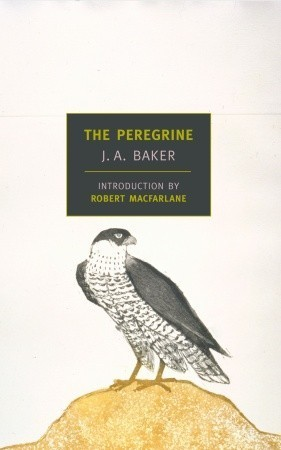The Peregrine by J.A. Baker
It is this extraordinary metamorphosis, magical and terrifying, that these beautifully written pages record.
Review: For months, author J.A. Baker spent hours tracking the daily movements of a pair of peregrine falcons in eastern England. He obsessively observed them for months, tracking their kills, watching them at rest, detailing their beautiful flights across the landscape. As time passes, his sense of human selves slowly erodes away, as he slowly begins to think more and more like a hawk.
Structured as journal entries, on each date, Baker describes in precise yet poetic language the movements of the hawks on each particular day. While the dates indicate he didn't venture out every single day, it's clear that he was devoting many hours across many days to tracking their movements. While hauntingly vivid and beautiful, this also functions as a descriptive field journal to annotate the movements of the peregrines.
The writing in this is truly lovely. The author captures nature and all the birds he sees in vivid detail. For instance, he describes the song of a nightjar by saying, "Its song is like the sound of a stream of wine spilling from a height into a deep and booming cask" And "If a song could smell, this song would smell of crushed grapes and almonds and dark wood" (11). And later a wren: "in sunlight, among fallen leaves in a dry ditch seemed suddenly divine, like a small brown priest in a parish of dead leaves and wintry hedges, devoted till death" (67). Winter woods are described as "a wrought-iron starkness of leafless trees" (88).
The author shares absolutely nothing about himself. He refers to humans in a distinctly derogatory tone and over time begins to act more and more bird like: "I found myself crouching over the kill, like a mantling hawk. [...] Unconsciously I was imitating the movements of a hawk, as in some primitive ritual; the hunter becoming the thing he hunts" (95). He says, "I am as solitary now as the hawk I pursue" (127). Although he does not share, the reader can detect a sadness or despair in the author; something in his own life is not quite right and he seeks escape in the pure instinct and lives of the birds he ceaselessly observes.
This book is a lyrical devotion to nature's beauty, as seen in the life of a hawk. The author's singular absorption in observing the birds is keenly felt; he clearly spent considerable time tracking the birds and then lovingly describing their habits and behavior in each journal entry.
Stars: 4



Comments
Post a Comment